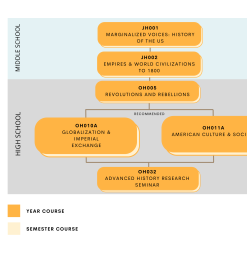Division Head
Dr. Michael Gonzales - Bio
Our Approach
The history curriculum introduces students to the rigorous study of significant historical periods and subjects, ranging from the origins of human civilization to the complexities of the twenty-first-century world.
As students complete their coursework, they learn how to read primary sources, think about historical causation, and write persuasive essays based upon the careful analysis of evidence. Students also learn how to examine the perspectives of diverse social and political groups. The history curriculum provides students with historical knowledge and analytical skills that will allow them to thrive in a university setting. Interdisciplinary in its approach, this curriculum helps students make connections between history and other disciplines in the social sciences and the humanities.
The sequence of history courses allows students to build upon recently acquired historical skills and knowledge as they progress through the curriculum. It begins with a middle school course, Introduction to United States History, which provides students with an understanding of the major political events and social changes in the United States between the American Revolution and World War I. This course introduces students to the study of brief primary sources. Empires and World Civilizations to 1800 broadens students’ understanding of history, focusing on the origins, development, and interactions of complex societies, beginning with ancient Mesopotamia and Egypt and concluding with 18th-century Europe. After completing World Civilizations, students have the opportunity to develop their skills in historical study in Revolutions and Rebellions. This course prepares students for advanced work in history through an exploration of the causes and nature of sudden, dramatic changes in modern societies, examining a range of texts and sources (including art, philosophy, and political debates). Students may pursue advanced history study in either Globalization and Imperial Exchange or AP US History. Globalization and Imperial Exchange deepens students’ knowledge of global history, sharpens their approach to primary sources, and encourages them to make connections between past and present events. AP United States History begins with a study of the colonial settlement of North America and continues into recent decades. In this course, students write original interpretations of primary sources and learn how to situate major developments in the United States within a global context. Students may then advance to an Advanced History Research Seminar, which provides students the opportunity to research and study a major historical topic extensively.


